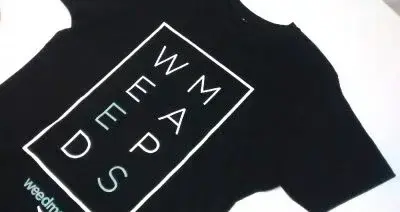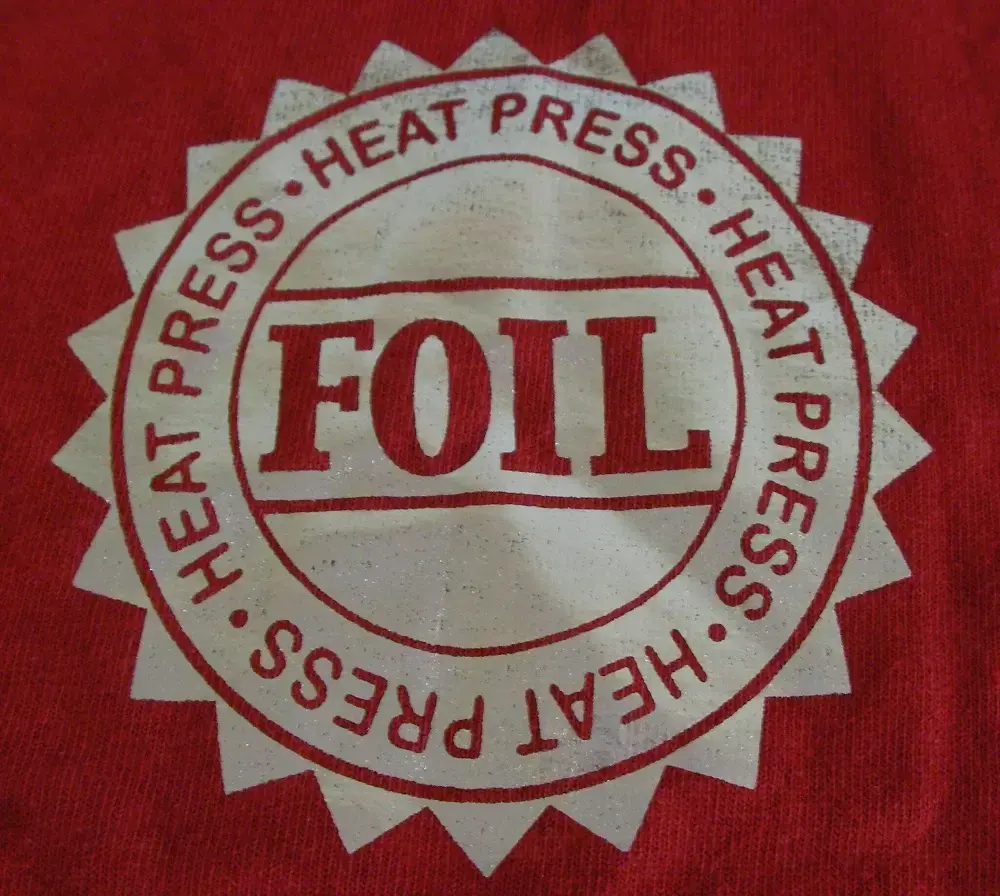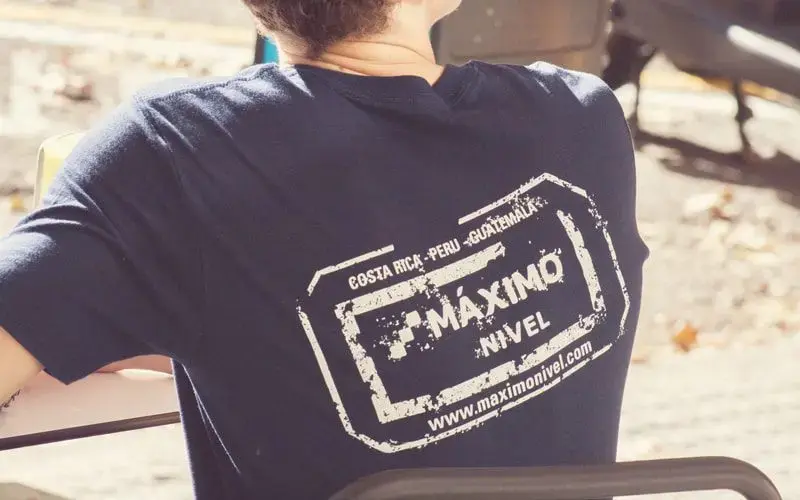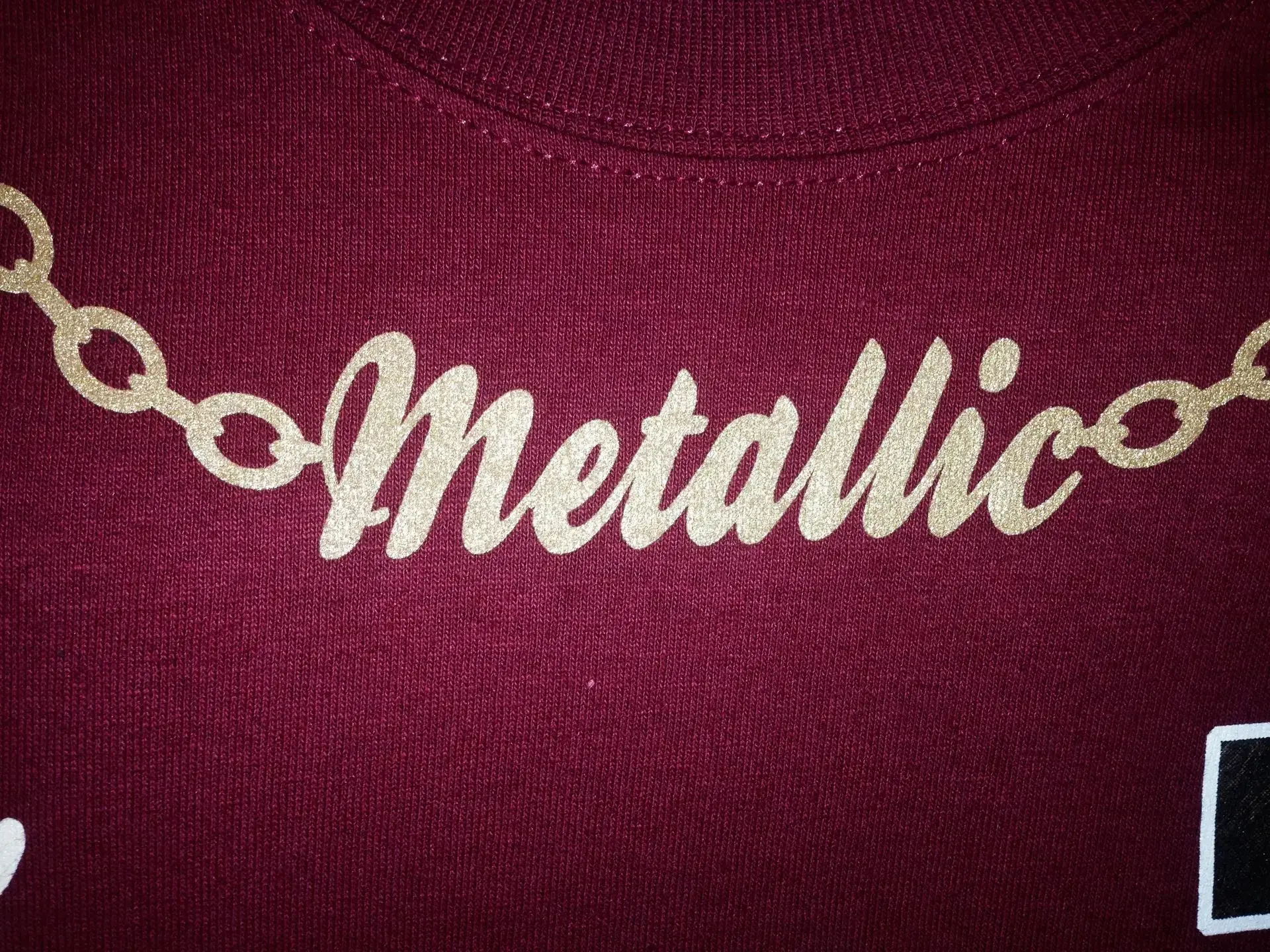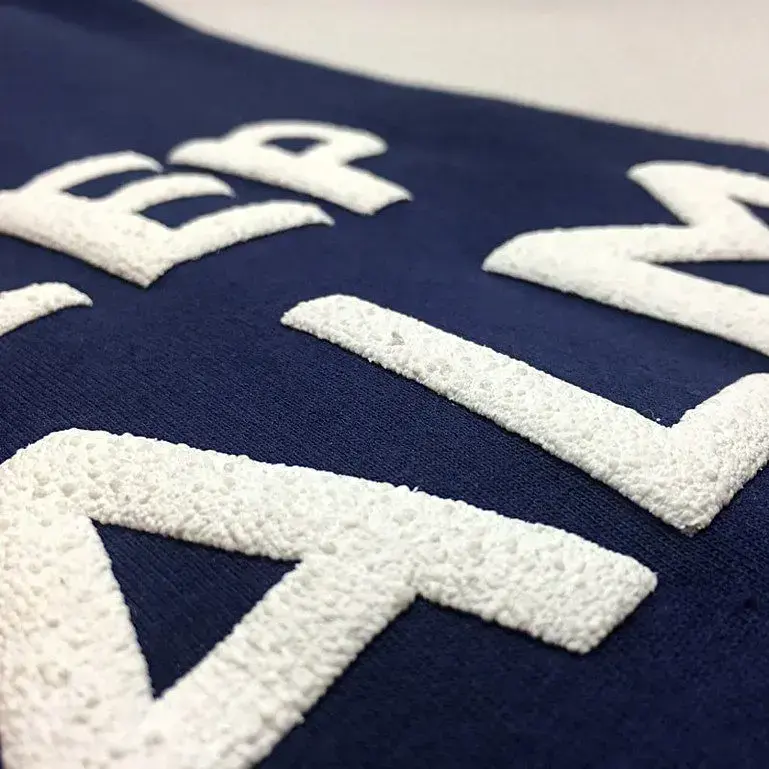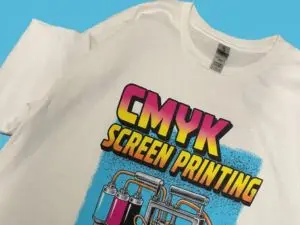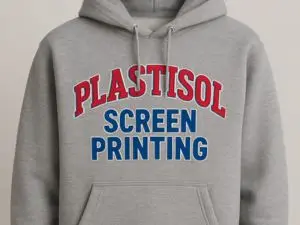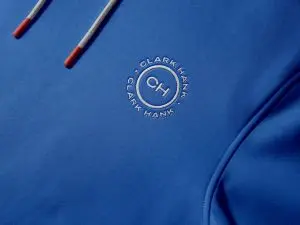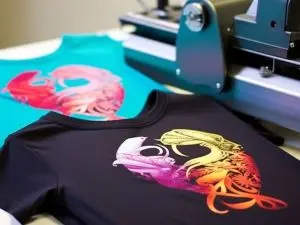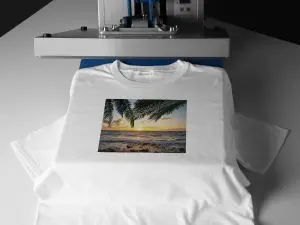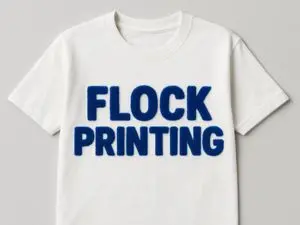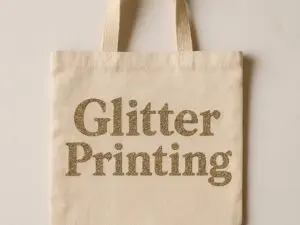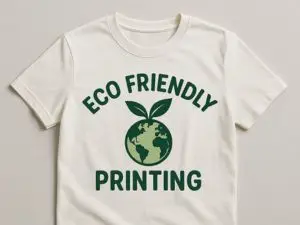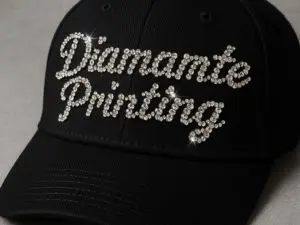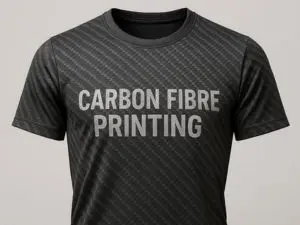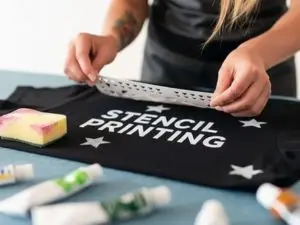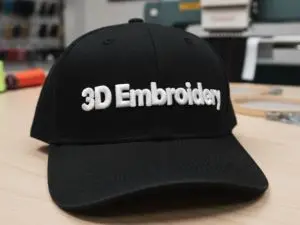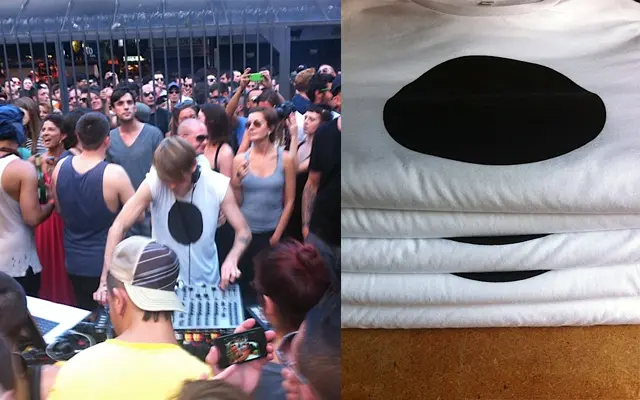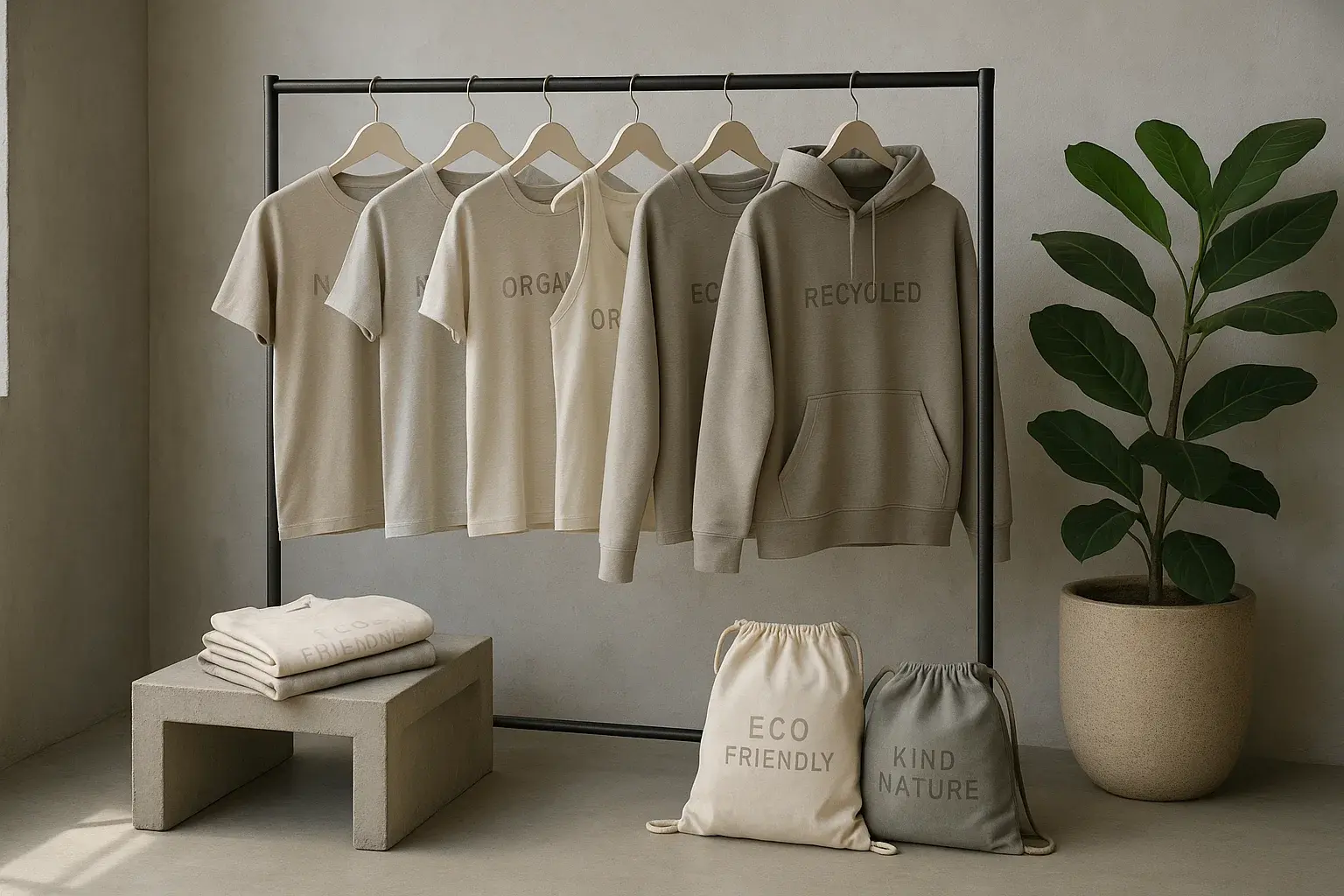What is Water-based screen printing?
Water-based screen printing is a textile printing technique that uses water-based inks instead of plastisol (plastic-based) inks. It’s widely considered the eco-friendly alternative in the screen printing world — and for good reason: it’s softer on the planet and on your garments.
Water-based screen printing works just like traditional screen printing, where ink is pushed through a mesh stencil (screen) onto a garment. The big difference is the type of ink used. Water-based inks are made primarily of water, pigment, and a few eco-safe additives — no PVC, phthalates, or harsh chemicals.
Instead of sitting on top of the fabric like plastisol, water-based ink actually soaks into the fibres, dyeing the garment itself. The result? A super-soft, breathable print that feels like it’s part of the fabric — because it is.
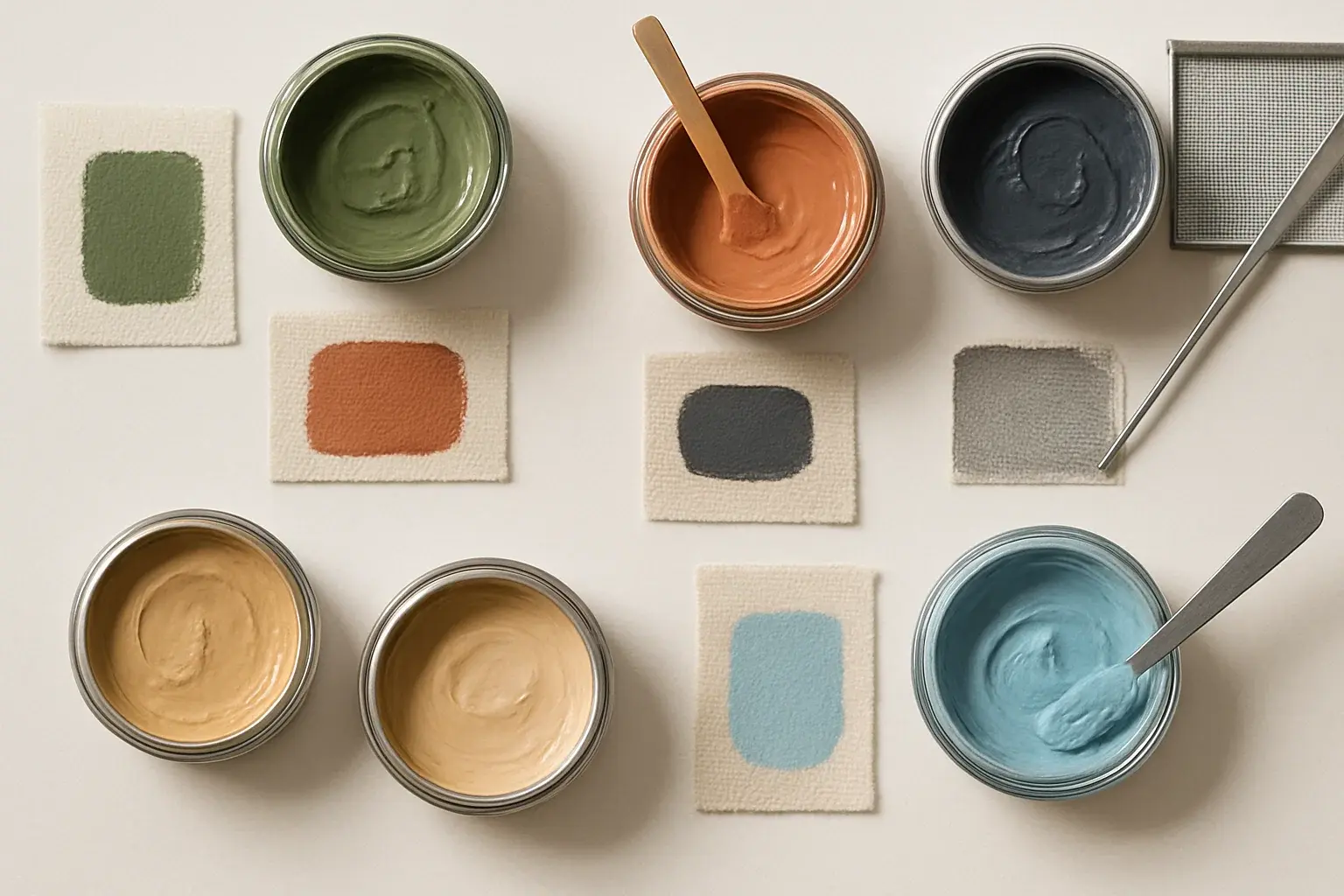
Why Choose Water-Based Screen Printing?
Eco-friendly screen printing is a great option if you’re looking for fashion-style prints with a softer finish or if you are thinking of printing onto baby clothes as the inks are less chemical based than the standard Plastisol inks.
This way of printing can be a great option if you are thinking about starting a line of clothing and want to go down the route of “caring for the environment” and “Social Responsibility”.
Eco-friendly screen printing follows the same rules and processes as standard screen printing but the inks used are all water-based. The water-based inks are more eco-friendly as they are water-based but they’re also a lot harder to manipulate and work with due to the quick drying time. There can also be more wastage as the excess ink needs to be disposed of and can not be reused.
This printing option is an ideal combination with our Fairwear and Sustainable Clothing products from Continental Clothing.
Please Note
Printed garments are more sensitive and need extra attention when it comes to washing.
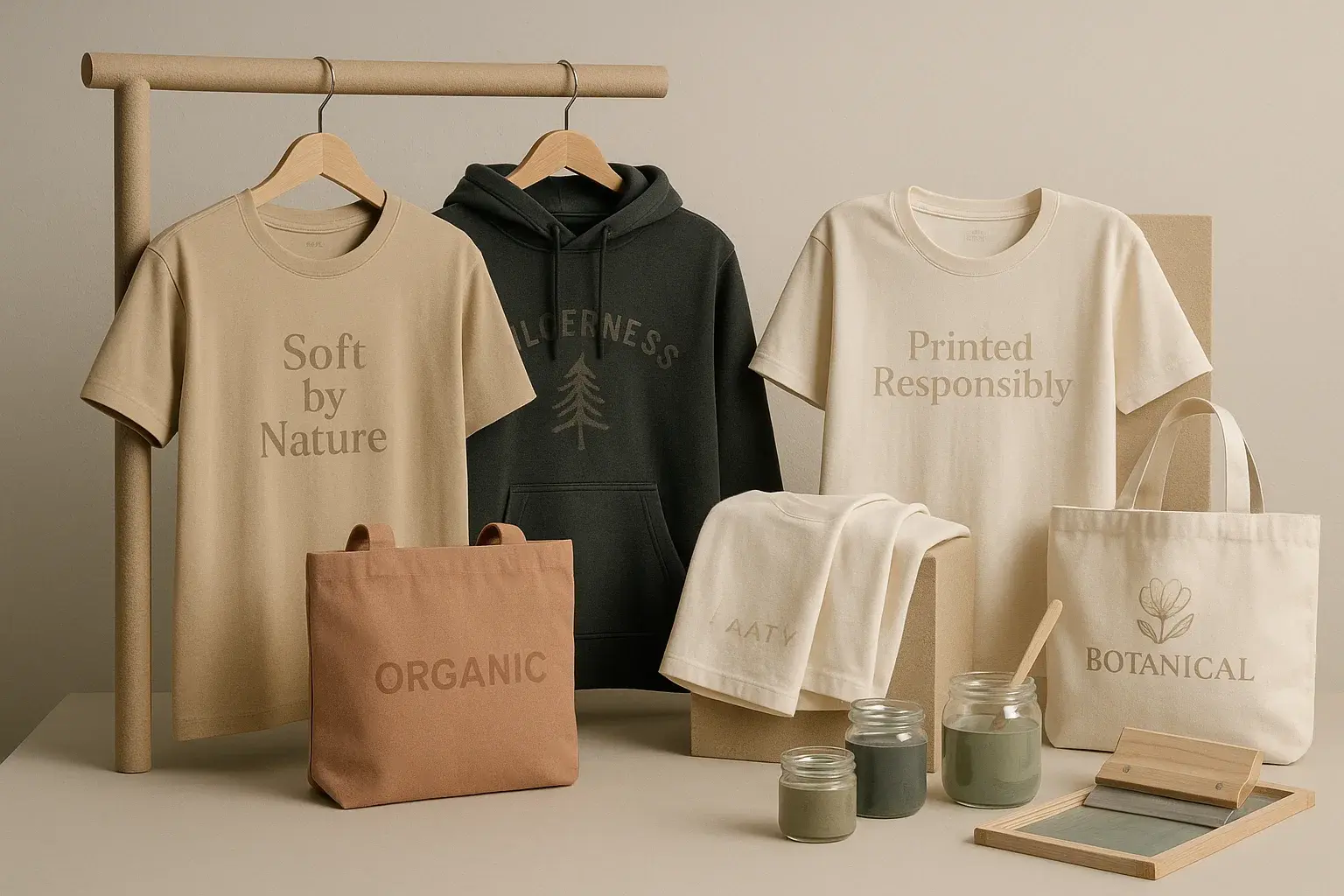
Uses for Eco-friendly Screen Printing
Eco-friendly screen printing, especially with water-based inks, is a fantastic option for brands and businesses that want to combine great design with responsible production. It offers a super-soft feel, breathable finish, and a significantly lower environmental impact — making it ideal for a wide range of applications.
Here are the most popular and impactful uses:
1. Sustainable Fashion & Apparel Brands
Whether you're launching a streetwear line or creating capsule collections, water-based screen printing is perfect for fashion-forward brands that prioritise sustainability. The soft-hand feel and high-quality finish make it ideal for t-shirts, hoodies, tank tops, and sweatshirts — especially when using organic cotton or recycled fabrics.
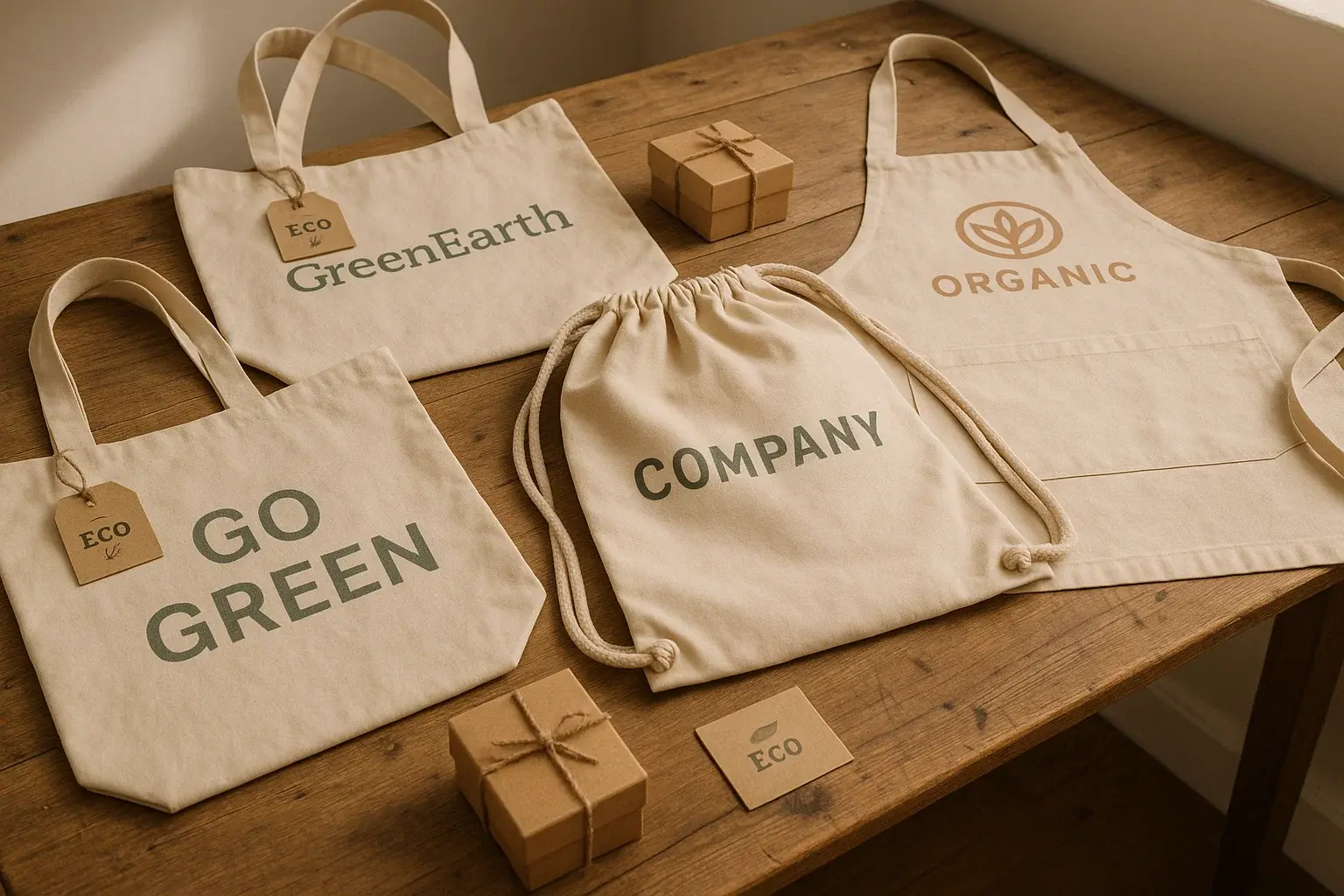
2. Eco-Friendly Promotional Products
Businesses looking to align with eco-conscious values can use water-based printing on tote bags, drawstring backpacks, aprons, and tees. It's a great choice for corporate gifting, green marketing campaigns, or event swag where the environmental impact matters as much as the design.
3. Children’s Clothing & Babywear
Water-based inks are non-toxic and free from harmful chemicals, making them especially suitable for baby and kids’ clothing. They’re soft, breathable, and safe for sensitive skin — a must for children’s wear brands.
4. Artistic & Minimalist Designs
Because water-based inks soak into the fabric, they’re ideal for subtle, tonal, or vintage-look prints. Artists, illustrators, and designers often choose this technique for minimalist graphics, hand-drawn styles, or designs with a soft aesthetic.
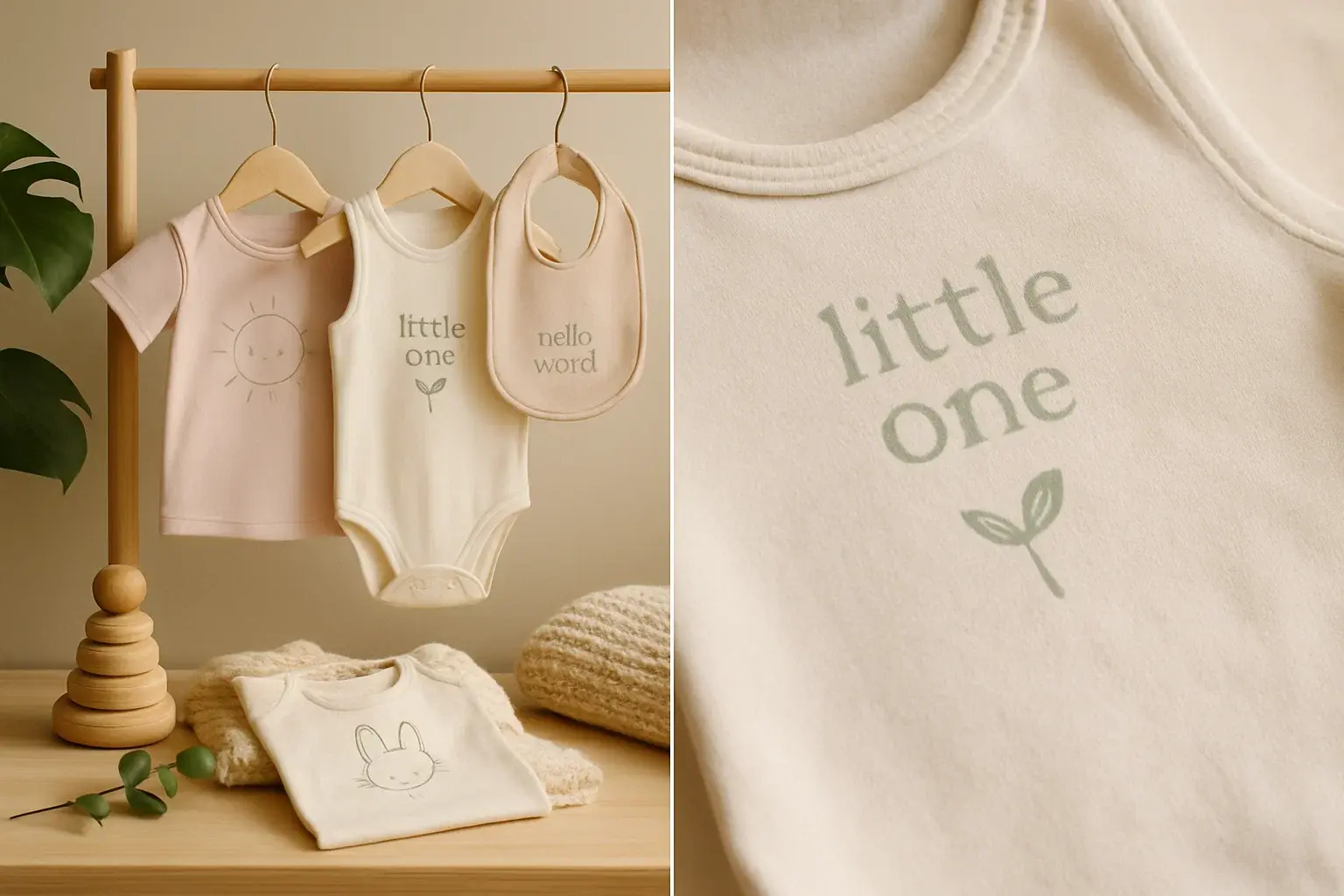
5. Wellness, Yoga & Lifestyle Brands
Comfort is king for wellness brands, and water-based printing offers a lightweight, breathable finish that’s perfect for loungewear, yoga tops, and eco totes. Combine it with natural or organic fabrics and you have a merch range that reflects your brand’s mindful ethos.
6. Sustainable Retail & Gift Shops
Retailers and boutiques focused on environmentally-friendly goods often stock locally-printed, small-batch apparel and accessories made with eco-conscious techniques. Water-based screen printing helps them offer products that are both beautiful and responsible.
7. Conscious Campaigns & Fundraisers
From climate marches to environmental charities, water-based printing is an ideal choice for t-shirts, banners, and merch tied to sustainability causes. It's a powerful way to walk the talk — reducing waste while raising awareness.

Screen Printing Water Based Ink vs Plastisol
When comparing screen printing water based ink vs plastisol, the key differences lie in the composition, feel, and environmental impact of the inks. Water based ink used in eco friendly screen printing soaks into the fibres of the fabric, creating a soft, breathable finish that feels like part of the garment. This makes water based screen printing ink ideal for retail-quality prints and fashion-forward brands. In contrast, plastisol ink sits on top of the fabric, resulting in a thicker print with a slightly rubbery texture.
One of the biggest advantages of using eco friendly inks screen printing is their low environmental impact. Water based fabric screen printing ink and eco screen printing ink are free from harmful PVCs and phthalates, making them a safer choice for both people and the planet. Curing water based screen printing ink typically requires higher heat or longer dwell times than plastisol, but the result is a premium-quality, long-lasting print that aligns with sustainable values.
For businesses committed to sustainability, choosing eco screen printing and partnering with eco friendly screen printing companies like Garment Printing ensures you get top-quality results while minimising environmental harm. Whether you're looking for fashion merchandise or branded apparel, water based printing ink is the ideal solution for ethical and impactful ink screen printing.

Advantages of Water-Based Screen Printing
1. Eco-Friendly
Made without harmful chemicals, PVC, or phthalates, water-based inks are safer for the environment, printers, and end users.
2. Super Soft Finish
The ink soaks into the fabric instead of sitting on top, resulting in a lightweight, breathable print that feels like part of the garment.
3. Ideal for Organic & Sustainable Textiles
Pairs beautifully with organic cotton, bamboo, and recycled fabrics — enhancing your brand’s sustainability credentials.
4. Great for Subtle, Tonal Designs
Perfect for minimalist, hand-drawn, or vintage-style prints that call for a soft aesthetic and natural ink absorption.
5. Safe for Children’s Clothing
Non-toxic and gentle on skin, making it a great choice for babywear and kidswear brands.
6. Water-Based Ink Clean-Up
No need for harsh solvents — screens and tools can be cleaned with water, reducing environmental impact in the studio.
Disadvantages of Water-Based Screen Printing
1. Less Vibrant on Dark Fabrics
Standard water-based inks can appear muted on dark garments unless paired with discharge ink or underbases.
2. Shorter Ink Shelf Life
Water-based inks can dry out more quickly on the screen, requiring faster production times and experienced handling.
3. More Sensitive to Printing Conditions
Humidity, temperature, and fabric type can affect ink performance, so this technique requires a skilled printer and careful setup.
4. Not Ideal for Bold or Raised Effects
If you’re after high-opacity, bright colours, or textured finishes like puff or foil, other techniques may be better suited.
Additional Screen Printing Techniques
Explore a variety of innovative screen printing enhancements designed to elevate your custom garments beyond the ordinary. Whether you're launching a fashion line, outfitting a team, or creating merchandise that turns heads, these specialty techniques offer unique finishes and creative textures that help your designs truly stand out. Each method offers distinct visual and tactile effects, providing powerful ways to reflect your brand identity, personality, or aesthetic vision. Dive into the options below to discover which technique aligns best with your goals.
More Printing Techniques
Looking for even more ways to customise your garments? Our extended range of printing options gives you the flexibility to achieve exactly the look and feel you’re after—whether it's bold and eye-catching, soft and subtle, or premium and polished. From small runs to large-scale orders, these techniques are tailored to suit different materials, budgets, and creative visions. Explore the full range below to find the best fit for your next project.
Frequently Asked Questions (FAQs)
Q: Is water-based screen printing ink eco-friendly?
Yes, water-based screen printing ink is considered eco-friendly. Unlike traditional plastisol inks, water-based inks do not contain harmful PVCs or phthalates. They soak into the fabric rather than sitting on top, making them a safer and more sustainable choice for both people and the environment.
Q: What is the most eco-friendly printing method?
Water-based screen printing is widely regarded as one of the most eco-friendly methods. It uses water-soluble inks that are free from harsh chemicals, resulting in less environmental impact during production and post-use. Combined with sustainable garments, it’s ideal for ethical and responsible printing.
Q: Is screen printing eco friendly?
Screen printing can be eco-friendly - especially when using water-based or discharge inks instead of plastisol. The environmental impact depends on the inks and materials used, as well as the waste management practices in place. At Garment Printing, we offer eco-conscious screen printing solutions for environmentally responsible projects.
Q: What is the most eco-friendly printing ink?
Water-based inks are the most eco-friendly printing inks available. They are free from harmful chemicals and heavy metals and can be safely used on clothing without compromising on quality or softness. These inks offer a breathable, long-lasting finish that aligns with sustainable values.
Q: What is water based screen printing?
Water based screen printing is a method that uses inks made primarily from water rather than plastic or petroleum-based compounds. These inks soak into the fabric rather than sitting on top, resulting in a softer, breathable finish.
Q: Why use water based screen printing ink?
Water based eco friendly screen printing ink is made without harsh chemicals, reducing environmental impact. The ink absorbs into the fibres for a lightweight, breathable finish and delivers rich colours, especially on lighter garments.




